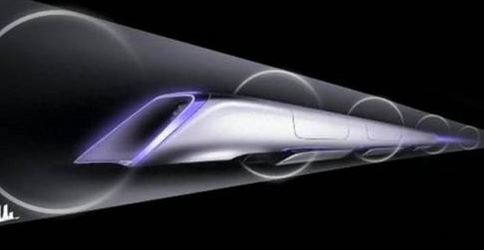Potential For Ultra-High Speed Travel For Low Energy Cost.
Potential For Ultra-High Speed Travel For Low Energy Cost.

Super high speed travel with very low energy cost.
It's here.
I am reminded of the key scene in Ayn Rand's classic novella 'Anthem', in which the protagonist presents a new and wonderful idea, an electric light bulb, and is rebuked by the leaders because his idea would cause fundamental changes to the system, because the leaders would have to figure out how to re-train and re-assign all the people working as candle makers.
But back to the Hyper-loop.
First announced by Elon Musk, CEO of the famously groundbreaking company Tesla Motors, in 2013, and now being carried out on different scales by 2 different companies, the idea is beautifully simple to understand. It involves a low pressure tube with the vehicle inside able to move faster because of no resistance, allowing fast speed with limited energy cost.
If built full scale, it could go around 800 KM/Hr, running entirely on solar power.
2 test tracks will be built, a short one by Space-X, best known as the first privately funded company to successfully launch, orbit and recover a spacecraft in 2010, and an 8 KM long test track by a new company called Hyperloop Transport Technologies that will be part of the public transit system in a new town called Quay Valley that developers plan on building in southern California.
It should be noted that it is not a good idea to build new towns in a place where water shortages are epidemic, and that the potential failure of that new, corporate planned community could end up stalling the Hypertube concept for decades.
Which speaks to a larger, all-encompassing issue that needs to be addressed in a major way very soon.
It's our economic system.
Not just for the sake of the Hypertube, but for all new technologies and innovations and potential for human progress that are limited to small and medium scale in a few locations while inefficiency and obsolescence reigns everywhere else only because the economic system demands that the best be reserved for those with the most, buy low, sell high, charge what the market will bear, etc., an ideology in which planned obsolesence and deliberate inefficiency for the sake of repeat-purchases is normal and acceptable.
Wouldn't it be great if this could be built as a standard transport method everywhere?
Built as part of the commons? Part of the infrastructure that serves the common interests of both individual citizens and the free-market, like roads, schools, etc., that define civilization?
Wouldn't it be great for technological progress if our schools were funded to the same level as the oil and gas industry? Or if they stopped subsidizing the oil and gas industry so that alternatives could become the norm instead of the exception?
But those companies have made a lot over the decades from technologies that are now obsolete, which means they have the financial power to prevent alternatives from emerging and to offer politicians lucrative rewards for themselves personally in return for mis-representing the public while in office.
It would be logical, rational, efficient to have the best methodology be the standard, but unfortunately our economic system won't allow that because any company trying to build it will have to make revenues far above cost in order to please shareholders, who often have long term investments in obsolete companies that dominate the market through pure financial inertia, and even if they found a way to get it built, a slip in the stock market or a legal issue completely unrelated to the project itself, or red tape resulting from lobbyists for competing corporations, could get it cancelled or closed at any moment.
We, as a species, could move forward by leaps and bounds if we had an intelligent, functioning economy that put knowledge, progress and actual achievement above narcissistic and self-serving social and economic achievement.
There was a time when competition strengthened us and was a motive for advancement, but that time in our evolution has passed and competetive economic systems are obsolete.
Competition is a waste of energy, and we can't afford to waste any more of our inellectual and physical energy on an economic system that demands constant competition.

